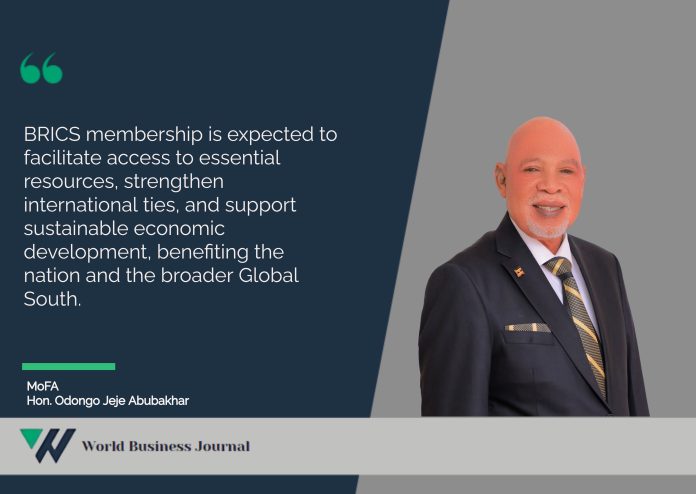Uganda’s Ministry of Foreign Affairs on the Role of BRICS and Diaspora Networks in National Development
World Business Journal talks to Gen. Odongo Jeje Abubakhar, the Minister of Foreign Affairs at MoFA, about diplomatic missions to improve bilateral relations with key partners and advance the nation’s interests globally, while also highlighting the economic benefits of BRICS membership and initiatives to leverage diaspora engagement for national growth.
How is Uganda strengthening bilateral relations with key partners to support its growing value-added exports and market access needs?
Our 39 diplomatic missions play a crucial role in advocating for the nation’s interests on the global stage.
Engagements with international organisations, such as the Group of 77 (G77), the Non-Aligned Movement (NAM), and the Forum on China-Africa Cooperation (FOCAC), as well as our recent inclusion as a partner state in BRICS, facilitate valuable exchanges of business opportunities and collaboration.
Through platforms like the Joint Ministerial (JMC) and Joint Permanent Commissions (JPC), we actively negotiate for improved market access for our products. For instance, our collaboration with Algeria has enabled successful exports of milk, while negotiations with Tanzania have cut transit fees for trucks from $500 to $142 and secured an additional 10,000 tonnes of sugar.
These collaborations improve access to international markets, enable the acquisition of hard-to-produce products and foster technology transfers.
What are the key objectives and expected benefits from BRICS membership?
Historically, Africa has struggled to secure development funding due to politicisation. BRICS offers an opportunity for uninhibited access to investment. For example, in September last year, China committed $50B for African investments, free from political ties. This funding can be directed toward infrastructure, trade, and connectivity projects.
The global economy is shifting, as dollar reserves have decreased from 70% to under 40% in 20 years and the combined GDP of Europe, the U.S., and Japan has fallen from over 40% to 23%. Meanwhile, the BRICS nations’ share of global GDP has increased to about 33%.
BRICS membership is expected to facilitate access to essential resources, strengthen international ties, and support sustainable economic development, benefiting the nation and the broader Global South.
In what ways are diaspora networks influencing economic growth and development back home?
We recognise the crucial role of Ugandans abroad in driving our nation’s development. To leverage this potential, we have conducted diaspora meetings in key regions, including the Middle East, Europe, and the USA. Participants have expressed concerns about unclear property ownership through intermediaries.
To address this, we encourage the formation of business associations that can pool resources for collective investment. We are also developing initiatives to incentivise diaspora engagement, focusing on co-investment opportunities that yield tangible benefits for Uganda. Through these partnerships, we aim to mobilise capital and strengthen the diaspora’s contribution to our economic growth.







